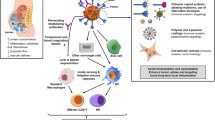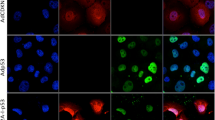Abstract
Clinical adenoviral p53 gene therapy has been shown by us and others to inhibit tumor growth of ovarian cancer with endogenous mutant p53. This study was designed to test the cooperative antitumor effect of standard combination chemotherapy using paclitaxel and carboplatin together with adenoviral p53 gene transfer in the presence of wild-type and mutant p53. Seven ovarian cancer cell lines with mutant p53 and seven ovarian cancer cell lines with wild-type p53 were tested. An E1-deleted adenovirus type 5 expressing p53 (ACNp53) was used for p53 gene transfer. p53 gene transfer at 50% transduction efficiency significantly reduced IC50 of carboplatin chemotherapy up to 49-fold, of paclitaxel chemotherapy up to six-fold, and of paclitaxel/carboplatin chemotherapy up to 19-fold in the wild-type p53 cell line OV-MZ-5. Synergism between ACNp53 and chemotherapy calculated by median-effect analysis was found at low drug concentrations in all cell lines independent of the p53 mutational status. In conclusion, adenoviral p53 gene transfer significantly increased the sensitivity of ovarian tumor cells to paclitaxel, to carboplatin and/or to the combination of both.
This is a preview of subscription content, access via your institution
Access options
Subscribe to this journal
Receive 12 print issues and online access
$259.00 per year
only $21.58 per issue
Buy this article
- Purchase on Springer Link
- Instant access to full article PDF
Prices may be subject to local taxes which are calculated during checkout
Similar content being viewed by others
References
Kristensen GB, Trope C . Epithelial ovarian carcinoma. Lancet. 1997;349:113–117.
Cannistra SA . Cancer of the ovary. N Engl J Med. 1993;329:1550–1559.
Berek JS, Bertelsen K, du Bois A, et al. Advanced epithelial ovarian cancer: 1998 consensus statements. Ann Oncol. 1999;10(Suppl 1):87–92.
Mc Guire WP, Hoskins WJ, Brady MF, et al. Cyclophosphamide and cisplatin compared with paclitaxel and cisplatin in patients with stage III and stage IV ovarian cancer. N Engl J Med. 1996;334:1–6.
Buller RE, Shahin MS, Horowitz JA, et al. Long term follow-up of patients with recurrent ovarian cancer after Ad p53 gene replacement with SCH 58500. Cancer Gene Ther. 2002;7:567–572.
Buller RE, Runnebaum IB, Karlam BY, et al. A phase I/II trial of rAd/p53 (SCH 58500) gene replacement in recurrent ovarian cancer. Cancer Gene Ther. 2002;9(7):553–566.
Auersperg N, Edelson MI, Mock SC, et al. The biology of ovarian cancer. Semin Oncol. 1998;25:281–304.
Irie T, Kigawa J, Minagawa Y, et al. Alteration of a p53 gene status affects outcome of patients with recurrent ovarian cancer. Oncology. 2000;58:237–241.
Nielsen LL, Lipari P, Dell J, et al. Adenovirus mediated p53 gene therapy and paclitaxel have synergistic efficacy in models of human head and neck, ovarian, prostate and breast cancer. Clin Cancer Res. 1998;4:835–846.
Gurnani M, Lipari P, Dell J, et al. Adenovirus-mediated p53 gene therapy has greater efficacy when combined with chemotherapy against human head and neck, ovarian, prostate and breast cancer. Cancer Chemother Pharmacol. 1999;44:143–151.
Cascallo M, Calbo J, Gelpi L, et al. Modulation of drug cytotoxicity by reintroduction of wild-type p53 gene (Ad5CMV-p53) in human pancreatic cancer. Cancer Gene Ther. 2000;7:545–556.
Horio Y, Hasegawa Y, Sekido Y, et al. Synergistic effects of adenovirus expressing wild-type p53 on chemosensitivity of non-small cell lung cancer cells. Cancer Gene Ther. 2000;7:537–544.
Mujoo K, Maneval DC, Anderson SC, et al. Adenoviral-mediated p53 tumor suppressor gene therapy of human ovarian carcinoma. Oncogene. 1996;12:1617–1623.
Wolf JK, Mills GB, Bazzet L, et al. Adenovirus-mediated p53 growth inhibition of ovarian cancer cells is independent of endogenous p53 status. Gynecol Oncol. 1999;75:261–266.
Wills KN, Maneval DC, Menzel P, et al. Development and characterization of recombinant adenoviruses encoding human p53 for gene therapy of cancer. Hum Gene Ther. 1994;5:1079–1088.
Mittereder N, March K, Trapnell BC . Evaluation of the concentration and bioactivity of adenovirus vectors for gene therapy. J Virol. 1996;70:7498–7509.
Bruening A, Koehler T, Quist S, et al. Adenoviral transduction efficiency of ovarian cancer cells can be limited by loss of integrin β3 subunit expression and increased by reconstitution of integrin αvβ3 . Hum Gene Ther. 2001;12:391–399.
Gianni L, Kearns CM, Giani A, et al. Nonlinear pharmacokinetics and metabolism of paclitaxel and its pharmacokinetic/pharmacodynamic relationships in humans. J Clin Oncol. 1995;13:180–190.
Mosmann T . Rapid colorimetric assay for cellular growth and survival: Application to proliferation and cytotoxicity assays. J Immunol Methods. 1983;65:55–63.
Chou TC, Talalay P . Quantitative analysis of dose-effect relationships: The combined effect of multiple drugs or enzyme inhibitors. Adv Enzyme Regul. 1984;22:27–55.
Nielsen LL, Maneval DC . P53 tumor suppressor gene therapy for cancer. Cancer Gene Ther. 1998;5:52–63.
Sato S, Kigawa J, Minagawa Y, et al. Chemosensitivity and p53-dependent apoptosis in epithelial ovarian carcinoma. Cancer. 1999;86:1307–1313.
Heise C, Ganly I, Kim YT, et al. Efficacy of a replication-selective adenovirus against ovarian carcinomatosis is dependent on tumor burden, viral replication and p53 status. Gene Therapy. 2000;7:1925–1929.
Jin X, Burke W, Rothman K, et al. Resistance to p53-mediated growth suppression in human ovarian cancer cells retain endogenous wild-type p53. Anticancer Res. 2002;22:659–664.
Willis A, Jung EJ, Wakefield T, et al. Mutant p53 exerts a dominant effect by preventing wild-type p53 from binding to the promoter of its target genes. Oncogene. 2004; Electronic publication ahead of print January 26th.
Song K, Cowan KH, Sinha BK . In vivo studies of adenovirus-mediated p53 gene therapy for cis-platinum-resistant human ovarian tumor xenografts. Oncol Res. 2000;11:153–159.
Neumunaitis J, Swisher SG, Timmons T, et al. Adenovirus-mediated p53 gene transfer in sequence with cisplatin to tumors of patients with non-small-cell lung cancer. J Clin Oncol. 2000;18:609–622.
Ngyen DM, Spitz FR, Yen N, et al. Gene therapy for lung cancer: enhancement of tumor suppression by combination of sequential systemic cisplatin and adenovirus-mediated p53 gene transfer. J Thorac Cardiovasc Surg. 1996;112:1372–1376.
Nishizaki M, Meyn RE, Levy LB, et al. Synergistic inhibition of human lung cancer cell growth by adenovirus-mediated wild-type p53 gene transfer in combination with docetaxel and radiation therapeutics in vitro and in vivo. Clin Cancer Res. 2001;7:2887–2897.
Thakahashi M, Kigawa J, Minagawa Y, et al. Sensitivity to paclitaxel is not related to p53-dependent apoptosis in ovarian cancer cells. Eur J Cancer. 2000;36:1863–1868.
Clayman GL, Frank DK, Bruso PA, et al. Adenovirus-mediated wild-type p53 gene transfer as a surgical adjuvant in advanced head and neck cancers. Clin Cancer Res. 1999;5:1715–1722.
Swisher SG, Roth JA, Neumunaitis J, et al. Adenovirus-mediated p53 gene transfer in advanced non-small-cell lung cancer. J Natl Cancer Inst. 1999;91:763–771.
Clayman GL, El-Naggar AK, Lippman SM, et al. Adenovirus-mediated p53 gene transfer in patients with advanced recurrent head and neck squamous cell carcinoma. J Clin Oncol. 1998;16:2221–2232.
Weill D, Mack M, Roth JA, et al. Adenoviral-mediated p53 gene transfer to non-small cell lung cancer trough endobronchial injection. Chest. 2000;118:966–970.
Nishizaki M, Fujiwara T, Tanida T, et al. Recombinant adenovirus expressing wild-type p53 is antiangiogenic: a proposed mechanism for bystander effect. Clin Cancer Res. 1999;5:1015–1023.
Nettelbeck DM, Rivera AA, Balague C, et al. Novel oncolytic adenoviruses targeted to melanoma: specific viral replication and cytolysis by expression of E1A mutants from the tyrosinase enhancer/promoter. Cancer Res. 2002;62:4663–4670.
Bruning A, Runnebaum IB . CAR is a cell–cell adhesion protein in human cancer cells and expressionally modulated by dexamethasone, TNFα and TGFβ. Gene Therapy. 2003;10:198–205.
Hemminski A, Zinn KR, Liu B, et al. In vivo molecular chemotherapy and noninvasive imaging with an infectivity-enhanced adenovirus. J Natl Cancer Inst. 2002;94:741–749.
Eisenhauer EA, ten Bokkel Huinink WW, Swenerton KD, et al. European–Canadian randomized trial of paclitaxel in relapsed ovarian cancer: high-dose versus low-dose and long versus short infusion. J Clin Oncol. 1994;12:2654–2666.
Acknowledgements
This project was supported by funds of the Deutsche Forschungsgemeinschaft (RU/476/3) granted to IB Runnebaum. We thank S Hees for the technical assistance in sequencing the cDNA of the cell lines confirmed by genomic DNA. Adenoviruses ACNp53 and AdGal was kindly provided by Dr Daniel Maneval (Canji Inc., San Diego, CA).
Author information
Authors and Affiliations
Rights and permissions
About this article
Cite this article
Quist, S., Wang-Gohrke, S., Köhler, T. et al. Cooperative effect of adenoviral p53 gene therapy and standard chemotherapy in ovarian cancer cells independent of the endogenous p53 status. Cancer Gene Ther 11, 547–554 (2004). https://doi.org/10.1038/sj.cgt.7700727
Received:
Published:
Issue Date:
DOI: https://doi.org/10.1038/sj.cgt.7700727
Keywords
This article is cited by
-
Upregulated p53 expression activates apoptotic pathways in wild-type p53-bearing mesothelioma and enhances cytotoxicity of cisplatin and pemetrexed
Cancer Gene Therapy (2012)
-
Enhanced Gene and siRNA Delivery by Polycation-Modified Mesoporous Silica Nanoparticles Loaded with Chloroquine
Pharmaceutical Research (2010)
-
Cytotoxicity of adenoviruses expressing the wild-type p53 gene to esophageal carcinoma cells is linked with the CAR expression level and indirectly with the endogenous p53 status
Cancer Gene Therapy (2009)
-
In vivo restoration of RhoB expression leads to ovarian tumor regression
Cancer Gene Therapy (2008)
-
E1A inhibits the proliferation of human cervical cancer cells (HeLa cells) by apoptosis induction through activation of HER-2/Neu/Caspase-3 pathway
Medical Oncology (2008)



